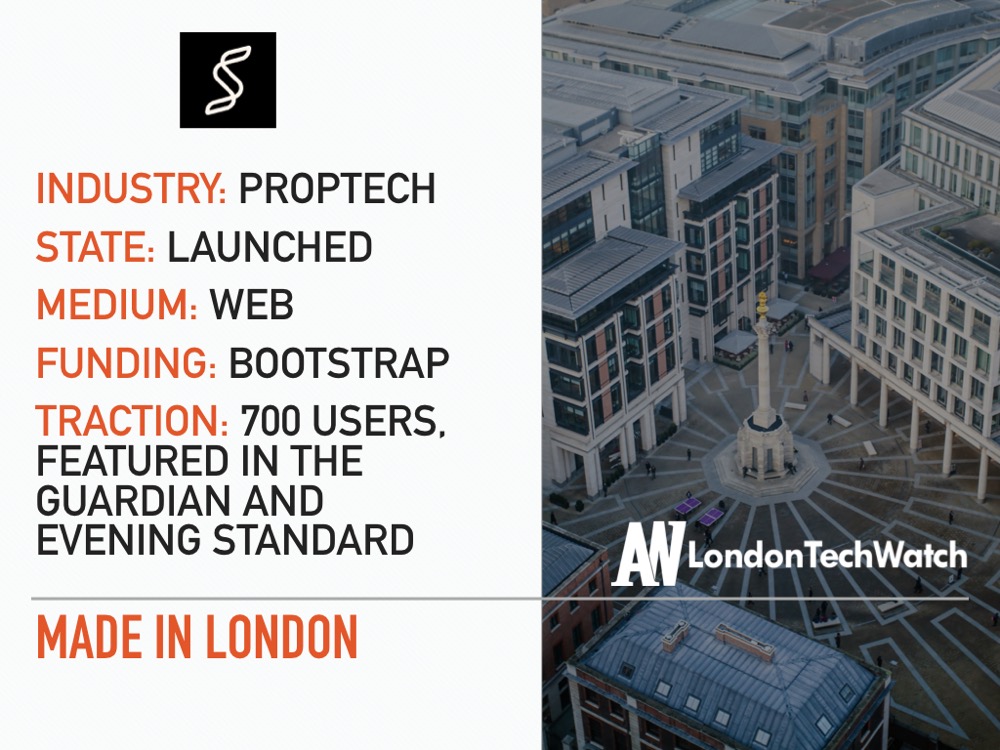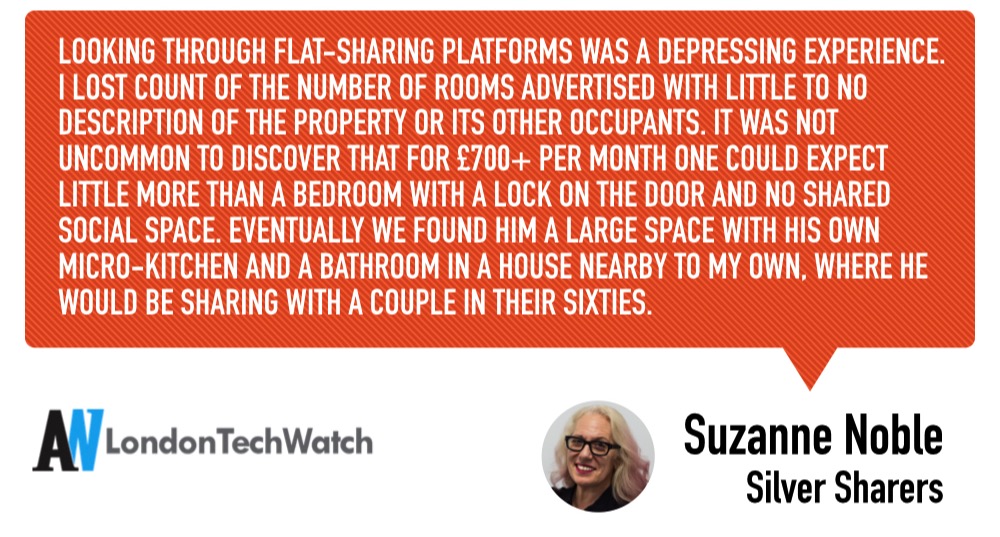Current roommate apps like Roomi and Roomster cater to millennials or recent grads, many of whom are hoping to find great digs in the city. However, these apps overlook older populations – especially those 50s+, who already have spare bedrooms and could benefit from supplemental income. Silver Sharers fills this market gap through its marketplace connecting homeowners aged 50+ to potential renters of any age. According to Silver Sharers, in the UK there are millions of people over the age of 50 with at least two spare bedrooms, and with housing prices surging in London, Silver Sharers provides a twofold solution to help renters find affordable accommodations while allowing older people to age in place. The company is currently participating in the prestigious Bethnal Green Ventures’ Tech For Good Programme.
London TechWatch caught up with Cofounder Suzanne Noble to discuss the inspiration behind Silver Sharers, the current state of the market for home sharing, and the company’s future plans.
Tell us about the product or service that Silver Sharers offers.
Silver Sharers helps find compatible long-term lodgers for older homeowners in London.
How is Silver Sharers different?
Unlike other flat/home-sharing platforms, we focus on the older homeowner and finding them a suitable match. It’s as much about making new friends as filling a room. We distribute the latest properties on a weekly newsletter to our subscribers, for free, which has helped us build trust and a community of like-minded customers.
 What market is Silver Sharers attacking and how big is it?
What market is Silver Sharers attacking and how big is it?
We’re aiming our service at homeowners aged 50+ (lodgers can be any age) – we know that in the UK alone there are 6M people over the age of 50 with at least two spare bedrooms and by 2040 more than 1/3rd of over people over the age of 60 will be renting. And that’s just in the UK. We’re in the midst of a global housing crisis so we know that we’re aiming to solve a massive problem both in terms of helping older people ‘age in place’ and in helping renters find affordable accommodation.
What is the business model?
It’s early days but currently, we charge a listing fee to the homeowner.
Who do you consider to be your primary competitors?
Like so many other businesses, social media platforms are our biggest competitor as well as sites like spareroom.com.
Tell us a little about your background and what inspired the business?
I live with my ‘home-mate’, a man in his 50s, and having recently discovered the pleasure of home-sharing as an older person, I was determined to find my partner a similar set-up after his business closed and he didn’t have the employment history to satisfy the traditional letting agent’s requirements for tenancy.
Looking through flat-sharing platforms was a depressing experience. I lost count of the number of rooms advertised with little to no description of the property or its other occupants. It was not uncommon to discover that for £700+ per month one could expect little more than a bedroom with a lock on the door and no shared social space. Eventually, we found him a large space with his own micro-kitchen and a bathroom in a house nearby to my own, where he would be sharing with a couple in their sixties.
I’m someone who enjoys finding solutions to problems and instinctively I knew that there was a problem begging to be solved. How many other older people in London, I wondered, were also seeking this type of shared living arrangement, either by choice or through financial necessity? I spent about six months researching the problem, eventually partnering with my cofounder who came from a proptech background. We went on Ycombinator’s Startup School programme last year and Silver Sharers was launched in Week 7 of the programme.
Tell us what building your company in London has been like?
Launching any business in one of the world’s largest cities is always going to be a challenge. I’m lucky to have a background in PR, having spent over 20 years in that sector, so we’ve been featured in The Guardian newspaper, Evening Standard, amongst others, which has helped the business reach millions of people in a very short space of time.
What are the milestones that you plan to achieve within six months?
We’re learning all the time and so speaking to as many of our customers as we can and prospective customers is very much top of our agenda. Our problem analysis runs to 3 pages and keeps growing. Social impact is very much at the heart of what we are doing so we want to make sure whatever we do works for as many people as possible. Our aim by the end of 6 months is to build what’s required.
If you could be put in touch with one person in the London Tech community who would it be and why?
I’ve been around the startup scene for the past 6 years so I’ve met many of the major players and I’m a familiar face. I’m more interested in getting in front of those who can influence policy and help us to support older homeowners and renters in a way that makes this type of living arrangement attractive to both parties.
What does being “Made in London” mean to you and your company?
Our business is 100% about supporting older homeowners in London and renters so the city and its challenges are what led me to start Silver Sharers. If I wasn’t a Londoner, it’s unlikely I would have started the business.
Our business is 100% about supporting older homeowners in London and renters so the city and its challenges are what led me to start Silver Sharers. If I wasn’t a Londoner, it’s unlikely I would have started the business.
What else can be done to promote early-stage entrepreneurship in London?
There’s a lot of hype in London around the startup scene but, because it’s a relatively young ecosystem compared to Silicon Valley, many of the advisors and mentors have little to no experience of building a business from the ground up and exiting. That’s not great if you’re an early-stage entrepreneur and looking for help. This is improving as the ecosystem matures and the hype gives way to entrepreneurs solving genuine problems. There are great businesses being created by women and those from underserved communities– it’s getting those businesses in front of the right type of investors that’s the hard part. It’s happening but is going to take some time.
What is your favorite restaurant in London?
I’m a real foodie so that’s a tough one. I’m a big fan of Mediterranean style cooking – Berber & Q, Bubala, Ottolenghi (for celebrations).
You are seconds away from signing up for the hottest list in LondonTech! Join the millions and keep up with the stories shaping entrepreneurship. Sign up today





